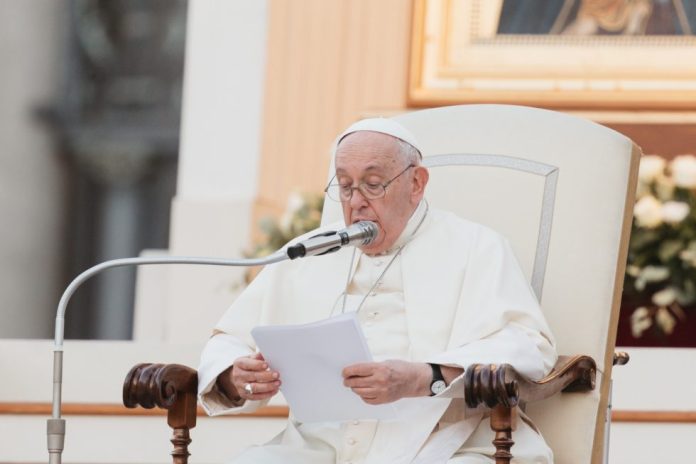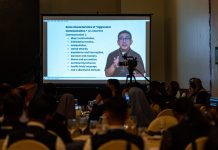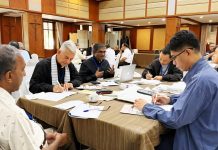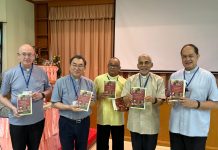ADDRESS OF HIS HOLINESS POPE FRANCIS
Paul VI Audience Hall – Wednesday, 4 October2023
Brothers and sisters, good afternoon!
I greet you all, with whom we begin this synodal journey.
I like to remember that it was Saint Paul VI who said that the Church in the West had lost the idea of synodality, and for this reason created the Secretariat for the Synod of Bishops, which has held many meetings, many Synods on various themes.
But the expression of synodality is not yet mature. I remember that I was a secretary in one of these Synods, and the Cardinal Secretary – a good Belgian missionary, very good – when I was preparing for the votes, came to look. “What are you doing?” – “What needs to be voted on tomorrow”. “What is it? No, we don’t vote on this”. “But look, it is synodal”. “No, no, we don’t vote”. Because then we still did not have the habit that everyone must express themselves freely. And so, slowly, over almost sixty years, the journey has taken this direction, and now we are able to arrive at this Synod on synodality. It is not easy, but it is good, it is very good. A Synod that all the bishops of the world wanted. In the survey that was carried out after the Synod for Amazonia, among all the world’s bishops, the second preference was this: synodality. In first place came priests, and in the third, I think a social question. But [this was] in second place. All the bishops in the world saw the need to reflect on synodality. Why? Because they had all understood that the fruit was ripe for something of this nature.
And with this spirit we start working today. And I like to say that the Synod is not a parliament, it is something else; that the Synod is not a meeting of friends to resolve some issues of the moment or to give opinions, it is something else. Do not forget, brothers and sisters, that we are not the protagonists of the Synod: it is the Holy Spirit. And if the Spirit who guides us is in our midst, it will be a good Synod. If among us there are other ways of going forward, for human, personal, or ideological interests, it will not be a Synod, it will be a more parliamentary meeting, which is another thing. A Synod is a journey the Holy Spirit makes. You have been given some papers with patristic texts that will help you in the opening of the Synod. They are taken from Saint Basil, who wrote that beautiful treatise on the Holy Spirit. Why? Because it is necessary to understand this reality, which is not easy; it is not easy.
When, on the fiftieth anniversary of the creation of the Synod, some theologians prepared a letter which I signed, it was a good step forward. But now we must find the explanation on this road. We are not the protagonists of the Synod; it is the Holy Spirit, and if we leave room for the Holy Spirit, the Synod will go well. You have been given these papers on Saint Basil in various languages: English, French, Portuguese and Spanish, so you have this in your hands. I will not mention these texts, on which I ask you to then reflect and meditate.
The Holy Spirit is the protagonist of ecclesial life: the plan for the salvation of humanity is fulfilled by the grace of the Holy Spirit. It is He who plays the decisive role. If we do not understand this, we will be like those people in the Acts of the Apostles: “Have you received the Holy Spirit?”. “What is the Holy Spirit? We haven’t even heard of it” (cf. 19:1-2). We must understand that He is the protagonist of the life of the Church; it is He who guides it forward.
The Holy Spirit triggers a profound and varied dynamism in the church community: the “commotion” of Pentecost. It is curious what happens at Pentecost: everything was well arranged, everything was clear… That morning there was a commotion, all languages are spoken, everyone understood… But one does not quite understand what its variety means… And after this, the great work of the Holy Spirit: not unity, no; harmony. He unites us in harmony, the harmony of all differences. If there is no harmony, there is no Spirit: it is He who does that.
Then, the third text that can help: the Holy Spirit is the harmonic composer of salvation history. Harmony – let us be careful – does not mean “synthesis”, but “bond of communion between dissimilar parts”. If we in this Synod end up with a declaration that is all the same, all the same, without nuances, the Spirit is not there, He has been left out. He makes that harmony which is not synthesis, it is a bond of communion between dissimilar parts.
The Church, a single harmony of voices, in many voices, in many voices, conducted by the Holy Spirit: this is how we must conceive of the Church. Every Christian community, every person has their own particularity, but these particularities must be integrated into the symphony of the Church, and that correct symphony is made by the Spirit: we cannot make it. We are not a parliament, we are not the United Nations, no, it is something else.
The Holy Spirit is the origin of harmony between the Churches. What Saint Basil says to his brother bishops is interesting: “Just as we esteem your mutual concord and unity as our good, so too we invite you to share in our sufferings caused by divisions and not to separate us from you because we are far apart by location and place, but, because we are united in communion according to the Spirit, to welcome us into the harmony of one body”.
The Holy Spirit leads us by the hand and comforts us. The presence of the Spirit is, if I may say so, almost maternal, like a mother who leads us, who gives us this consolation. The Consoler is one of the names of the Spirit. The consoling action of the Holy Spirit is portrayed by the innkeeper to whom the man is entrusted after being robbed by brigands (cf. Lk 10:34-35): Basil interprets that parable of the Good Samaritan, and in the inn-keeper he sees the Holy Spirit who allows the good will of one man and the sin of another to go in a harmonious way.
Moreover, the One who guards the Church is the Holy Spirit. Then, the Holy Spirit has a multifaceted paracletic way of working. We must learn to listen to the voices of the Spirit: they are all different. Learn to discern.
And then, the Spirit is the One who makes the Church. There is a very important link between the Word and the Spirit. We can think about this: the Word and the Spirit. Scripture, the Liturgy, and ancient tradition tell us about the “sadness” of the Holy Spirit, and one of the things that saddens the Holy Spirit the most are empty words. Empty words, worldly words, and – stooping a little to a certain human but not good habit – chatter. Chatter is the anti-Holy Spirit, it is contrary to Him. It is a very common disease among us. And empty words sadden the Holy Spirit. “And do not grieve the Holy Spirit of God, in whom you were sealed for the day of redemption” (cf. Eph 4:30). What a great evil it is to sadden the Holy Spirit of God, need we say? Gossip, backbiting: this saddens the Holy Spirit. It is the most common disease in the Church, gossip. And if we do not let Him cure us of this disease, it will hardly be a good synodal path. At least in here: if you don’t agree with what that bishop or that nun or that layman there says, say it to his face. That is why it is a synod. To tell the truth, not to gossip from beneath the table.
The Holy Spirit confirms us in faith. It is He who does so continually…
These texts of Saint Basil, read them: they are in your language, because I think they will help us to make room for the Spirit in our hearts. I repeat: it is not a parliament; it is not a pastoral meeting for the Church. This is a syn-odos: walking together is the programme. We have done many things, as His Eminence said: consultation, all of this, with the People of God. But it is the Holy Spirit who takes this in hand, who guides it. If He is not there, this will not yield a good result.
I insist on this: please, do not sadden the Spirit. And in your theology, make room for the Holy Spirit. And also in this Synod, to discern the voices of the Spirit from those which are not of the Spirit, which are worldly. In my opinion, the worst ailment we see in the Church today – always, but today as well – is what goes against the Spirit, that is, spiritual worldliness. A spirit, but not holy: worldliness. Beware of this: let us not take the place of the Holy Spirit with worldly things – even good ones, such as good sense: this helps, but the Spirit goes further. We must learn to live in our Church with the Holy Spirit. Remember, reflect on these texts by Saint Basil, which will help us a great deal.
Then, I want to say that in this Synod – also to make room for the Holy Spirit – there is the priority of listening, there is this priority. And we must give a message to the press workers, to journalists, who do an excellent job, a very good job. We have to provide a communication that is a reflection of this life in the Holy Spirit. It takes an asceticism – excuse me for speaking to journalists like this – a certain restraint of the public word to protect this. And what is published, let it be in this atmosphere. Some will say – they are saying it – that the bishops are afraid and that is why they do not want journalists to speak. No, the work of journalists is very important. But we must help them to say this, this going in the Spirit. And more than the priority of speaking, there is the priority of listening. And I ask journalists to please make people understand this, so that they know that the priority is listening. When there was the Synod on the family, there was public opinion, formed by our worldliness, that communion was to be granted to the divorced: and this was how we entered the Synod. When there was the Synod for Amazonia, there was public opinion, pressure, regarding the viri probati: we entered under this pressure. Now there are some hypotheses on this Synod: “What will they do?”, “Perhaps the priesthood for women”… I don’t know, these things that they say outside. And they very often say that bishops are afraid of communicating what happens. Therefore, I ask you, communicators, to perform your duties well, correctly, so that the Church and people of good will – the others will say what they like – understand that also in the Church there is the priority of listening. Convey this: it is very important.
Thank you for helping us in this “pause” for the Church. The Church has paused, just as the Apostles paused after Good Friday, on that Holy Saturday, locked away: but they did it out of fear, we do not. But it is paused. It is a pause for all the Church, to listen. This is the most important message. Thank you for your work, thank you for what you do. And do not forget, if you can, read these texts by Saint Basil, which are of great help. Thank you.
source: https://asia.synod2023.org/opening-of-the-works-of-the-xvi-ordinary-general-assembly-of-the-synod-of-bishops-for-a-synodal-church-communion-participation-and-mission/






